Aurivo’s dairy ingredients business is mainly made up of butter and powder sales.
Aurivo produces a lot of enriched powders, which essentially are dried milk with the fat percentage increased with the addition of varying levels of vegetable oil.
Aurivo sell this product in Africa, which is a growing market. Once it lands in Africa, the powder is sold in small local stores.
Turnover in dairy ingredients jumped from €172m to €198m
The African consumer takes the powder home where water is added again. This product is used as a substitute for milk in Africa, where they can’t get ‘normal’ milk as Irish consumers know it.
A significant bounce in powder and butter sales helped reinforce western-based Aurivo’s financial results for 2020.
Turnover in dairy ingredients jumped from €172m to €198m. This underpinned a better overall financial position for the co-op.
Aurivo has invested over €50m of capital expenditure in this space with the building of the new dryer in Ballaghadereen
The dairy ingredients business is where Aurivo has really focused when we take a five-year view of the business. If we look back to 2016, dairy ingredients sales were €102m. Now they are close to €200m.
Aurivo has invested over €50m of capital expenditure in this space with the building of the new dryer in Ballaghadereen which increases milk processing capacity and allows the business push more milk to powders if the price is good.
Consumer foods
The consumer foods business for 2020 was up a touch, but, more or less static in sales and liquid milk volumes are back when we take a five-year view.
In 2016 the liquid milk pool was 120m litres and in 2020 there were 110m litres processed and sold as liquid milk.
While this might sound negative, if ingredients are making more money for the business, then it’s a good move and maybe more volume should be pushed towards dairy ingredients rather than liquid.
Insulated from COVID-19 restrictions, the consumer foods turnover remained steady, moving from €95m in 2019 to €97m in 2020.
Aurivo processes and sells an organic milk called ‘Organic for us’. Aurivo has 12 organic suppliers and they get a price premium.
Marts business
Last year was a very difficult one for marts, with livestock sales very interrupted with COVID-19 restrictions.
It is fair to say that delivering a turnover of €66m is a very good achievement given what happened and how the business had to adapt and swivel into online trading almost overnight.
Prior to last year, probably one of the more difficult years for the marts business was 2018 (turnover €71m) when marts had to close for two weeks because of Storm Emma.
The slight downward trend in cattle is more pronounced in the west than elsewhere
While 2020 can be deemed positive, it is also probably fair to say there is capacity for further improvement.
If we look back to 2016, the turnover in the marts business was €78m with cattle numbers of 76,858 traded in 2016 compared to 60,000 cattle traded in 2020..
The slight downward trend in cattle is more pronounced in the west than elsewhere.
Marts in the south and east are probably seeing more of the dairy-bred cattle mart bounce. Aurivo has four marts in Balla, Mohill, Ballymote and Ballinrobe. All are online trading.
Agribusiness
Aurivo runs the Homeland agribusiness in the west, with 34 stores across the region.
A redevelopment plan is ongoing which means spending on upgrading and refreshing stores.
Feed tonnage sold was up 8%
In Letterkenny, Co Donegal, the Homeland store recently moved to a new site to allow consumers greater purchasing options with more garden centre products and paint in stock. This has proved an attractive business in lockdown.
While the stores had a mixed year on footfall with COVID-19 restrictions, it didn’t take away from sales, with more moving online to Homeland.ie and Aurivo’s new nutrition website nutrias.ie.
Feed tonnage sold was up 8%. Overall in 2020, volume and revenue were up in agribusiness. Agribusiness delivered a sales turnover of €127.9m, an 11.2% increase on the previous year (€115m).
Investments
Aurivo has a 27% stake in County Mayo Radio Ltd and received a €150,000 dividend from this in 2020, similar to 2019. The co-op also owns a 70% stake in a Sligo farm that is leased out and a 50% share in Glanoir Energy Ltd, a JV company looking to grow a biomass energy system.
Governance
Governance change saw dairy farmer Sean Sweeney step off the Aurivo board to allow him sit on the new board at Ornua.
Two new and relatively young board members were elected in Sean O’Donnell and John Payne.
Long-serving board member Pat Duffy didn’t go forward for chair re-election in November 2020 and subsequently dairy farmer Raymond Barlow took the chair reins.
Management changes saw Aaron Forde leave his role as CEO in late December 2019 and former chief financial officer Donal Tierney appointed CEO in early 2020.
Results moving in
right direction
When comparing dairy businesses we have to be careful in terms of comparing like with like.
Aurivo has a significant marts business which is low margin, but an essential service to farmers in the west.
It also has a significant agribusiness division and has invested in new stores and upgrading stores in recent years – it is cash hungry but also provides a service function to farmers.
The Aurivo financial results for 2020 move in all the right direction
Both of these parts of the business are relatively low-margin, which has to be taken into account when comparing Aurivo’s results with those of a dairy-only business that was selling dairy commodities and nothing else.
We also have to be mindful that the business and catchment range is across 16 counties. Compare that to Carbery (west Cork), which has a similar sized milk pool, but with the catchment all in the one county, and you could even say one half of the county.
The Aurivo financial results for 2020 move in all the right direction and it looks like some of the investments made in previous years are finally returning to the bottom line.
The liquid milk business remains difficult for the three national players in that space, with supermarkets holding all the cards.
The other big positive for Aurivo is that net debt moved from €18.8m to €2.2m (0.15 times earnings down from 2.2).
Last year Aurivo pulled out of participating in the annual IFJ/KPMG milk price review as it wanted to include milk price paid for liquid milk in its returns, which conflicted with the definition used for the annual exercise.
Q&A
with Aurivo CEO Donal Tierney
What is the total number of milk suppliers in ROI and NI? 
85 NI and 850 ROI.
Any Brexit concerns?
The EU-UK trade deal and the NI Protocol were welcomed and mean Aurivo has avoided the harsh impact of trade tariffs on the movement of goods between the UK and Ireland. However, there are additional ‘non-tariff’ costs for businesses exporting or importing goods to/from Britain and there are also unresolved issues relating to milk of mixed origin (NI & ROI). Aurivo awaits to see the implications that mixed milk product may have on future EU supports, such as private storage aid, and decisions around this.
There was a writedown in goodwill last year in For Goodness. Goodwill is down €2m again in 2020? Is this For Goodness as well or other exceptionals?
It is important to note that this is just the normal annual amortisation of goodwill and intangibles that arose on previous acquisitions, namely Donegal Creameries (milk business 2012) and For Goodness Shakes (2015). This amortisation expense is charged to the P&L every year, just like depreciation. Normal accounting practice.
Can you explain the exceptional charge of €152,000 in 2020?
This relates to a rationalisation restructuring charge – normal course of business etc.
Retail sales of liquid milk and butter must have bounced in 2020 with supermarket sales – any numbers on this?
Aurivo’s liquid milk volumes were 110m litres, which was up 1m litres on 2019. This is the net movement of growth in Aurivo’s brand plus/minus the movement on private label tenders. Retail butter sales were up 14.7% for 2020, reflecting the COVID shifts in buying patterns.
Any potential cap on milk supply at peak months coming?
Aurivo is contracted to take milk supply from a number of other co-ops in 2021, this, coupled with the growth from its own milk supply base (which is running higher than envisaged), will mean that the co-op will be close to capacity over peak, but it does not envisage a cap on members’ supply.
The balance sheet bounced back to €67m from under €60m in 2019 results – any comment?
The increase was driven by improved retained profits for 2021.
Marts did very well to almost hit 2019 numbers given what happened – any comment?
Aurivo’s marts performed very well given the challenges presented by COVID-19. Marts were closed for a period in April/May 2020 and then went online only for a long period. Overall cattle numbers were down 9% with the average price up 6.5%.
In the annual report, your quoted average price paid for milk in 2020 was 35.61c/l including VAT (2019: 34.35c/l including VAT). Was this manufacturing or liquid or the combined?
Combined; Aurivo considers all milk to be liquid milk so this is our actual average ROI milk price incl VAT.
Aurivo’s dairy ingredients business is mainly made up of butter and powder sales.
Aurivo produces a lot of enriched powders, which essentially are dried milk with the fat percentage increased with the addition of varying levels of vegetable oil.
Aurivo sell this product in Africa, which is a growing market. Once it lands in Africa, the powder is sold in small local stores.
Turnover in dairy ingredients jumped from €172m to €198m
The African consumer takes the powder home where water is added again. This product is used as a substitute for milk in Africa, where they can’t get ‘normal’ milk as Irish consumers know it.
A significant bounce in powder and butter sales helped reinforce western-based Aurivo’s financial results for 2020.
Turnover in dairy ingredients jumped from €172m to €198m. This underpinned a better overall financial position for the co-op.
Aurivo has invested over €50m of capital expenditure in this space with the building of the new dryer in Ballaghadereen
The dairy ingredients business is where Aurivo has really focused when we take a five-year view of the business. If we look back to 2016, dairy ingredients sales were €102m. Now they are close to €200m.
Aurivo has invested over €50m of capital expenditure in this space with the building of the new dryer in Ballaghadereen which increases milk processing capacity and allows the business push more milk to powders if the price is good.
Consumer foods
The consumer foods business for 2020 was up a touch, but, more or less static in sales and liquid milk volumes are back when we take a five-year view.
In 2016 the liquid milk pool was 120m litres and in 2020 there were 110m litres processed and sold as liquid milk.
While this might sound negative, if ingredients are making more money for the business, then it’s a good move and maybe more volume should be pushed towards dairy ingredients rather than liquid.
Insulated from COVID-19 restrictions, the consumer foods turnover remained steady, moving from €95m in 2019 to €97m in 2020.
Aurivo processes and sells an organic milk called ‘Organic for us’. Aurivo has 12 organic suppliers and they get a price premium.
Marts business
Last year was a very difficult one for marts, with livestock sales very interrupted with COVID-19 restrictions.
It is fair to say that delivering a turnover of €66m is a very good achievement given what happened and how the business had to adapt and swivel into online trading almost overnight.
Prior to last year, probably one of the more difficult years for the marts business was 2018 (turnover €71m) when marts had to close for two weeks because of Storm Emma.
The slight downward trend in cattle is more pronounced in the west than elsewhere
While 2020 can be deemed positive, it is also probably fair to say there is capacity for further improvement.
If we look back to 2016, the turnover in the marts business was €78m with cattle numbers of 76,858 traded in 2016 compared to 60,000 cattle traded in 2020..
The slight downward trend in cattle is more pronounced in the west than elsewhere.
Marts in the south and east are probably seeing more of the dairy-bred cattle mart bounce. Aurivo has four marts in Balla, Mohill, Ballymote and Ballinrobe. All are online trading.
Agribusiness
Aurivo runs the Homeland agribusiness in the west, with 34 stores across the region.
A redevelopment plan is ongoing which means spending on upgrading and refreshing stores.
Feed tonnage sold was up 8%
In Letterkenny, Co Donegal, the Homeland store recently moved to a new site to allow consumers greater purchasing options with more garden centre products and paint in stock. This has proved an attractive business in lockdown.
While the stores had a mixed year on footfall with COVID-19 restrictions, it didn’t take away from sales, with more moving online to Homeland.ie and Aurivo’s new nutrition website nutrias.ie.
Feed tonnage sold was up 8%. Overall in 2020, volume and revenue were up in agribusiness. Agribusiness delivered a sales turnover of €127.9m, an 11.2% increase on the previous year (€115m).
Investments
Aurivo has a 27% stake in County Mayo Radio Ltd and received a €150,000 dividend from this in 2020, similar to 2019. The co-op also owns a 70% stake in a Sligo farm that is leased out and a 50% share in Glanoir Energy Ltd, a JV company looking to grow a biomass energy system.
Governance
Governance change saw dairy farmer Sean Sweeney step off the Aurivo board to allow him sit on the new board at Ornua.
Two new and relatively young board members were elected in Sean O’Donnell and John Payne.
Long-serving board member Pat Duffy didn’t go forward for chair re-election in November 2020 and subsequently dairy farmer Raymond Barlow took the chair reins.
Management changes saw Aaron Forde leave his role as CEO in late December 2019 and former chief financial officer Donal Tierney appointed CEO in early 2020.
Results moving in
right direction
When comparing dairy businesses we have to be careful in terms of comparing like with like.
Aurivo has a significant marts business which is low margin, but an essential service to farmers in the west.
It also has a significant agribusiness division and has invested in new stores and upgrading stores in recent years – it is cash hungry but also provides a service function to farmers.
The Aurivo financial results for 2020 move in all the right direction
Both of these parts of the business are relatively low-margin, which has to be taken into account when comparing Aurivo’s results with those of a dairy-only business that was selling dairy commodities and nothing else.
We also have to be mindful that the business and catchment range is across 16 counties. Compare that to Carbery (west Cork), which has a similar sized milk pool, but with the catchment all in the one county, and you could even say one half of the county.
The Aurivo financial results for 2020 move in all the right direction and it looks like some of the investments made in previous years are finally returning to the bottom line.
The liquid milk business remains difficult for the three national players in that space, with supermarkets holding all the cards.
The other big positive for Aurivo is that net debt moved from €18.8m to €2.2m (0.15 times earnings down from 2.2).
Last year Aurivo pulled out of participating in the annual IFJ/KPMG milk price review as it wanted to include milk price paid for liquid milk in its returns, which conflicted with the definition used for the annual exercise.
Q&A
with Aurivo CEO Donal Tierney
What is the total number of milk suppliers in ROI and NI? 
85 NI and 850 ROI.
Any Brexit concerns?
The EU-UK trade deal and the NI Protocol were welcomed and mean Aurivo has avoided the harsh impact of trade tariffs on the movement of goods between the UK and Ireland. However, there are additional ‘non-tariff’ costs for businesses exporting or importing goods to/from Britain and there are also unresolved issues relating to milk of mixed origin (NI & ROI). Aurivo awaits to see the implications that mixed milk product may have on future EU supports, such as private storage aid, and decisions around this.
There was a writedown in goodwill last year in For Goodness. Goodwill is down €2m again in 2020? Is this For Goodness as well or other exceptionals?
It is important to note that this is just the normal annual amortisation of goodwill and intangibles that arose on previous acquisitions, namely Donegal Creameries (milk business 2012) and For Goodness Shakes (2015). This amortisation expense is charged to the P&L every year, just like depreciation. Normal accounting practice.
Can you explain the exceptional charge of €152,000 in 2020?
This relates to a rationalisation restructuring charge – normal course of business etc.
Retail sales of liquid milk and butter must have bounced in 2020 with supermarket sales – any numbers on this?
Aurivo’s liquid milk volumes were 110m litres, which was up 1m litres on 2019. This is the net movement of growth in Aurivo’s brand plus/minus the movement on private label tenders. Retail butter sales were up 14.7% for 2020, reflecting the COVID shifts in buying patterns.
Any potential cap on milk supply at peak months coming?
Aurivo is contracted to take milk supply from a number of other co-ops in 2021, this, coupled with the growth from its own milk supply base (which is running higher than envisaged), will mean that the co-op will be close to capacity over peak, but it does not envisage a cap on members’ supply.
The balance sheet bounced back to €67m from under €60m in 2019 results – any comment?
The increase was driven by improved retained profits for 2021.
Marts did very well to almost hit 2019 numbers given what happened – any comment?
Aurivo’s marts performed very well given the challenges presented by COVID-19. Marts were closed for a period in April/May 2020 and then went online only for a long period. Overall cattle numbers were down 9% with the average price up 6.5%.
In the annual report, your quoted average price paid for milk in 2020 was 35.61c/l including VAT (2019: 34.35c/l including VAT). Was this manufacturing or liquid or the combined?
Combined; Aurivo considers all milk to be liquid milk so this is our actual average ROI milk price incl VAT.





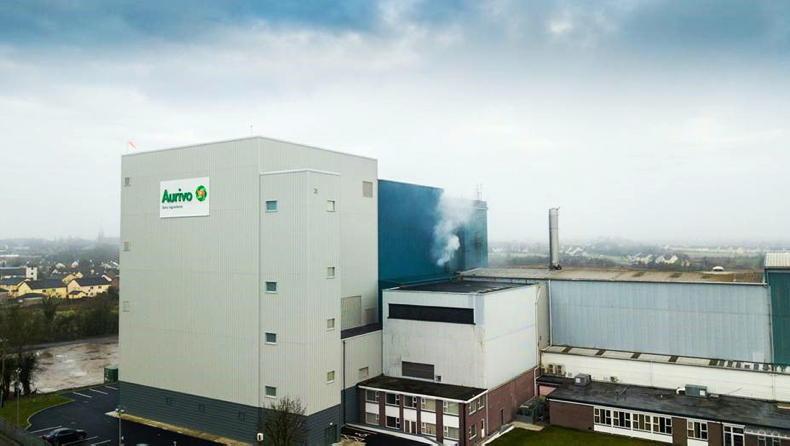
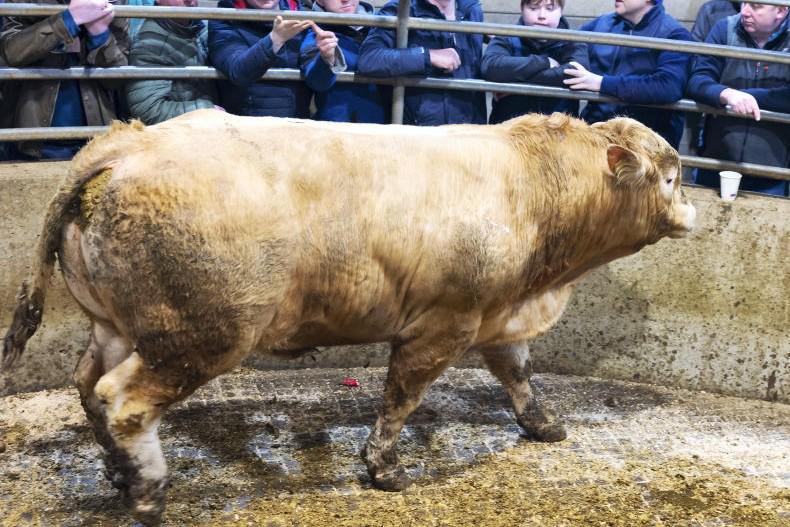

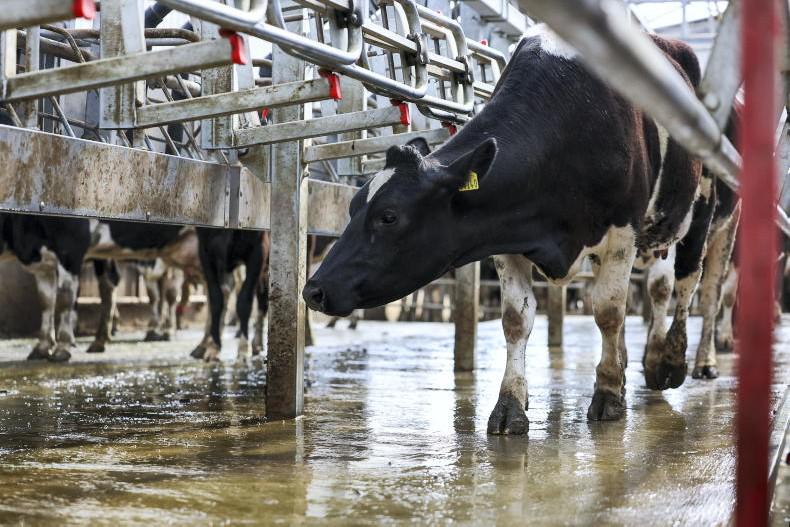
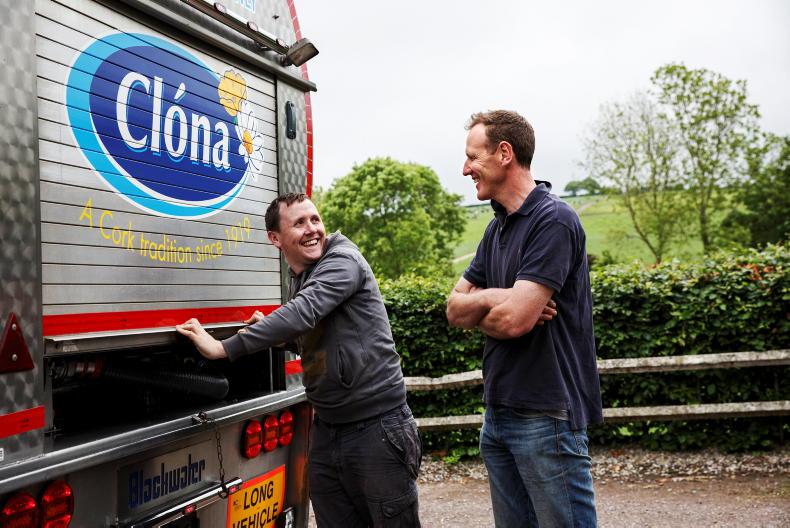
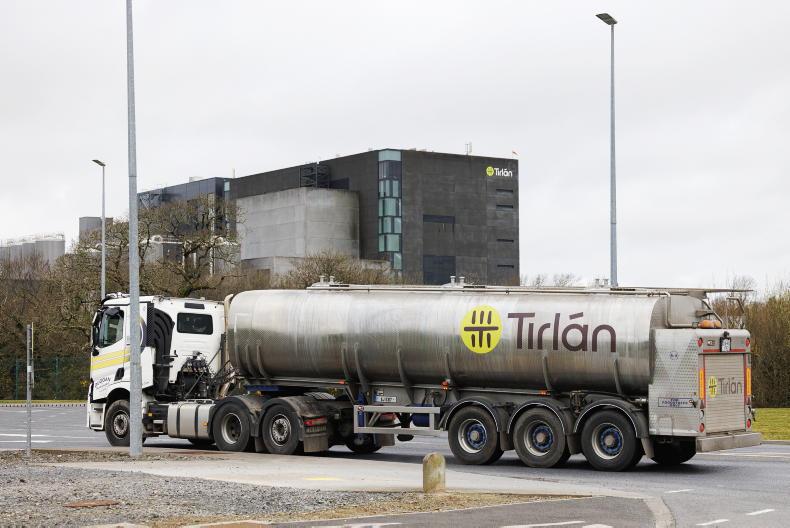
SHARING OPTIONS